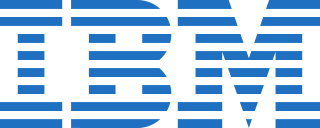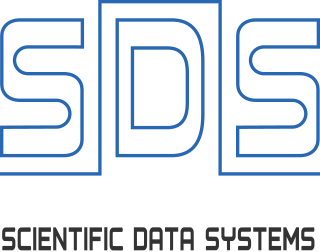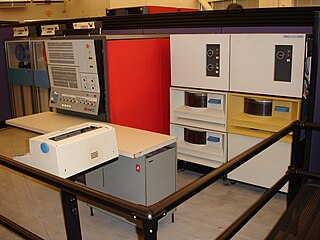Related Research Articles
In computing, a compiler is a computer program that translates computer code written in one programming language into another language. The name "compiler" is primarily used for programs that translate source code from a high-level programming language to a low-level programming language to create an executable program.

A computer program is a sequence or set of instructions in a programming language for a computer to execute. It is one component of software, which also includes documentation and other intangible components.
PL/I is a procedural, imperative computer programming language initially developed by IBM. It is designed for scientific, engineering, business and system programming. It has been in continuous use by academic, commercial and industrial organizations since it was introduced in the 1960s.
MAD is a programming language and compiler for the IBM 704 and later the IBM 709, IBM 7090, IBM 7040, UNIVAC 1107, UNIVAC 1108, Philco 210-211, and eventually IBM System/370 mainframe computers. Developed in 1959 at the University of Michigan by Bernard Galler, Bruce Arden and Robert M. Graham, MAD is a variant of the ALGOL language. It was widely used to teach programming at colleges and universities during the 1960s and played a minor role in the development of Compatible Time-Sharing System (CTSS), Multics, and the Michigan Terminal System computer operating systems. The original version of the chatbot ELIZA was written in MAD-SLIP.

Malcolm Douglas McIlroy is an American mathematician, engineer, and programmer. As of 2019 he is an Adjunct Professor of Computer Science at Dartmouth College. McIlroy is best known for having originally proposed Unix pipelines and developed several Unix tools, such as spell, diff, sort, join, graph, speak, and tr. He was also one of the pioneering researchers of macro processors and programming language extensibility. He participated in the design of multiple influential programming languages, particularly PL/I, SNOBOL, ALTRAN, TMG and C++.
In computer science, imperative programming is a programming paradigm of software that uses statements that change a program's state. In much the same way that the imperative mood in natural languages expresses commands, an imperative program consists of commands for the computer to perform. Imperative programming focuses on describing how a program operates step by step, rather than on high-level descriptions of its expected results.

The IBM System/34 was an IBM midrange computer introduced in 1977. It was withdrawn from marketing in February 1985. It was a multi-user, multi-tasking successor to the single-user System/32. It included two processors, one based on the System/32 and the second based on the System/3. Like the System/32 and the System/3, the System/34 was primarily programmed in the RPG II language.
In computer software, a general-purpose programming language (GPL) is a programming language for building software in a wide variety of application domains. Conversely, a domain-specific programming language (DSL) is used within a specific area. For example, Python is a GPL, while SQL is a DSL for querying relational databases.

The history of programming languages spans from documentation of early mechanical computers to modern tools for software development. Early programming languages were highly specialized, relying on mathematical notation and similarly obscure syntax. Throughout the 20th century, research in compiler theory led to the creation of high-level programming languages, which use a more accessible syntax to communicate instructions.
XPL, for expert's programming language is a programming language based on PL/I, a portable one-pass compiler written in its own language, and a parser generator tool for easily implementing similar compilers for other languages. XPL was designed in 1967 as a way to teach compiler design principles and as starting point for students to build compilers for their own languages.

Distributed Processing Programming Executive is a discontinued operating system introduced by IBM, pre-installed on the IBM 8100 and later ported to the ES/9370.
WATFIV, or WATerloo FORTRAN IV, developed at the University of Waterloo, Canada is an implementation of the Fortran computer programming language. It is the successor of WATFOR.

Scientific Data Systems (SDS), was an American computer company founded in September 1961 by Max Palevsky, Arthur Rock and Robert Beck, veterans of Packard Bell Corporation and Bendix, along with eleven other computer scientists. SDS was the first to employ silicon transistors, and was an early adopter of integrated circuits in computer design. The company concentrated on larger scientific workload focused machines and sold many machines to NASA during the Space Race. Most machines were both fast and relatively low priced. The company was sold to Xerox in 1969, but dwindling sales due to the oil crisis of 1973–74 caused Xerox to close the division in 1975 at a loss of hundreds of millions of dollars. During the Xerox years the company was officially Xerox Data Systems (XDS), whose machines were the Xerox 500 series.

PRIMOS is a discontinued operating system developed during the 1970s by Prime Computer for its minicomputer systems. It rapidly gained popularity and by the mid-1980s was a serious contender as a mainline minicomputer operating system.

The IBM System/360 Model 30 was a low-end member of the IBM System/360 family. It was announced on April 7, 1964, shipped in 1965, and withdrawn on October 7, 1977. The Model 30 was designed by IBM's General Systems Division in Endicott, New York, and manufactured in Endicott and other IBM manufacturing sites outside of U.S.

The SDS 930 was a commercial 24-bit computer using bipolar junction transistors sold by Scientific Data Systems. It was announced in December 1963, with first installations in June 1964.
Micro Focus International plc was a British multinational software and information technology business based in Newbury, Berkshire, England. The firm provided software and consultancy. The company was listed on the London Stock Exchange and the New York Stock Exchange until it was acquired by the Canadian software firm OpenText in January 2023.

In computing, a compiler is a computer program that transforms source code written in a programming language or computer language, into another computer language. The most common reason for transforming source code is to create an executable program.
References
- 1 2 3 Lahey, Thomas M., "Tom Lahey's Fortran experiences" Archived 2011-07-09 at the Wayback Machine , from comp.lang.fortran, February 25, 2005.
- ↑ Van Vleck, Tom (ed.). "The Choice of PL/I". - PL/I for the MULTICS project which mentions Digitek's role in writing a PL/I compiler.
- ↑ A programmed operator was a hardware concept on the SDS 900 series of computers similar to the concept of the Atlas computer's "extracodes". The programmed operator calling mechanism allowed computer operation codes to be interpreted by software code. See Scientific Data Systems, "SDS 900 Series", technical manual. Cf. Programmed Operator. Also see "SDS 910 Reference Manual", February 1970. Cf. Appendix E. page A-19, "Programmed Operators" for an in-depth discussion of Programmed Operators.
- ↑ Bell, Gordon, "Computer Structures: Readings and Examples", Section 6: Processors with multiprogramming ability, p.275. "The [SDS] 940 uses a memory map which is almost a subset of that of Atlas but is more modest than that of the IBM 360/67 [Arden et al., 1966] and GE 645 [Dennis, 1965; Daley and Dennis, 1968]. A number of instructions are apparently built in via the programmed operator calling mechanism, based on Atlas extracodes (Chap. 23). The software-defined instructions emphasize the need for hardware features. For example, floating-point arithmetic is needed when several computer-bound programs are run. The SDS 945 is a successor to the 940, with slightly increased capability but at a lower cost."